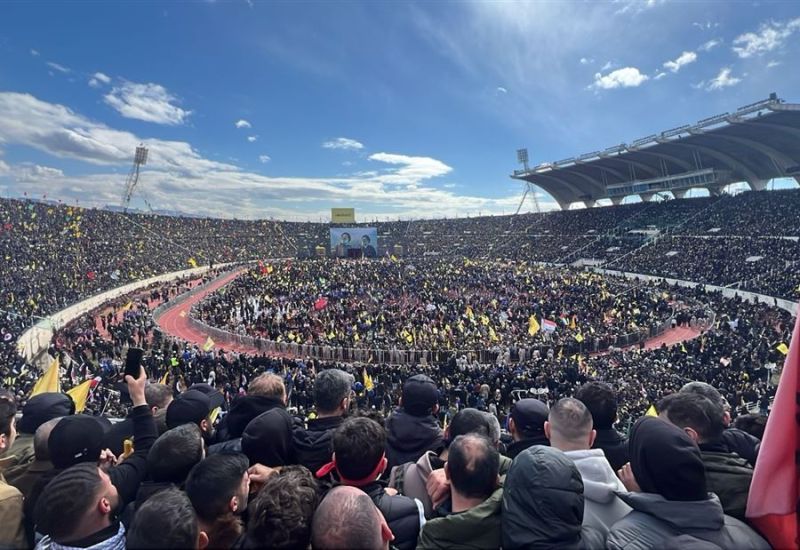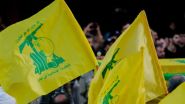
Under a sky crisscrossed by Israeli military aircraft and Lebanese Army helicopters, the funeral of former Hezbollah Secretary-General Hassan Nasrallah and former head of Hezbollah’s Executive Council Hashem Safieddine took place, nearly five months after their deaths in Israeli airstrikes. Tens of thousands of people poured into the capital to pay tribute to the man who led the Iran-backed Shiite movement for more than three decades.
The ceremony was held at the Camille Chamoun Sports City Stadium in Beirut’s southern suburbs, a Hezbollah stronghold. Authorities implemented strict security measures, including the closure of main roads and the temporary suspension of flights at Rafic Hariri International Airport, to manage the massive influx of attendees and dignitaries.
Army units and Internal Security Forces were deployed along all major routes, directing the crowds heading toward the venue. Given the high turnout, Beirut International Airport, located nearby, suspended operations from noon to 4 PM.
Parliament Speaker Nabih Berri, who attended the ceremony, was repeatedly referred to as the “Big Brother” by Hezbollah speakers, who also emphasized his role as President Joseph Aoun’s representative. Labor Minister Mohammad Haidar represented Prime Minister Nawaf Salam.
Among the prominent figures present were senior Iranian officials, including Iranian House Speaker Mohammad-Bagher Ghalibaf and Foreign Minister Abbas Araghchi, as well as Iraqi politicians, militia commanders and other regional allies.
Also present at the funeral were the families of former Iranian President Ebrahim Raisi, former Foreign Minister Hossein Amir-Abdollahian, former al-Quds Force commander Qasem Soleimani, presidential adviser Mohsen Rezaee and several judicial figures, along with an official delegation of nearly 40 MPs.
The defining moment of the funeral procession came as the coffins of Nasrallah and Safieddine were carried in an open-top vehicle, with the crowd chanting, “O Nasrallah, we remain true to the promise” and “We will not be humiliated.”
Excerpts from speeches by Nasrallah and Safieddine, hailing Hezbollah supporters’ sacrifices, were played as a final tribute, while Israeli fighter jets roared overhead at low altitude, their noise competing with the chants of the mourners.
Meanwhile, the eulogy delivered by Hezbollah Secretary-General Naim Qassem was significantly less impactful. The same messages, repeated in each of his previous speeches, dominated his recorded address: a subjective reading of Hezbollah’s “victory” over Israel; an emphasis on “the magnitude of the resistance’s sacrifices” in the face of “the unprecedented crimes” committed by Israel in Lebanon and Gaza; and the “endurance of the resistance,” particularly given that Israeli violations of Lebanese sovereignty and the occupation of parts of Lebanese territory, in his view, legitimize a counteraction by Hezbollah, “which will choose to act based on assessments made by its command.” Yet, in a striking contradiction, he added, “The most important decision we made was for the state to assume its responsibility after the resistance prevented the enemy from achieving its goals.”
While chanting, “We will not accept that the United States controls the country” and “What Israel could not take by war will not be taken by politics,” Qassem reiterated the “principles” upheld by Hezbollah:
“We exercise our right to resistance based on our assessment of interests and circumstances; we follow the state’s approach to expel the enemy diplomatically.”
“We will confront Trump’s plan against Palestine.”
“We will participate in building the state in accordance with the Taif Agreement and will take part in the reconstruction plan.”
“We are committed to national unity and civil peace, with Lebanon being a permanent homeland for all its people, and we consider ourselves among its sons.”
Such statements remain confined to broad slogans, leaving a lingering sense of skepticism.
The ceremony began with a message from Ayatollah Ali Khamenei, praising the late Nasrallah and Safieddine, while signaling to “the enemy that the resistance is here to stay and will not stop until it achieves its goal,” though without further details.
The Arabic-speaking spokesperson for the Israeli army, Avichay Adraee, also directed a message “to all those mourning Nasrallah.” He wrote on his Facebook account: “Whom are you mourning? The man who turned Lebanon into a bankrupt state? (…) The one who destroyed the economy, divided the people, and dragged the country into futile wars? (…) He took Lebanon hostage to the ‘Islamic revolution’ project (…) Do you truly mourn him, or are you refusing to face the truth?”
Nasrallah, Hezbollah’s leader for 32 years, was killed on September 27, 2024, in an Israeli airstrike targeting the group’s headquarters in the southern suburbs of Beirut. His death was regarded as a significant blow to the pro-Iranian group. General Abbas Nilforoushan, a senior commander of Iran’s al-Quds Force, responsible for the country’s external operations, was also killed in the same strike. Safieddine, Nasrallah’s designated successor, was killed a few days later in another Israeli airstrike.
The funeral ceremony was delayed by ongoing hostilities and Israeli airstrikes until a ceasefire was reached in late November 2024. Meanwhile, the bodies of Nasrallah and Safieddine were temporarily buried in undisclosed locations.
Hezbollah used the funeral to showcase its resilience and its ability to mobilize supporters despite the heavy losses. This was highlighted by statements from various officials. At Beirut International Airport, Ghalibaf, the head of Iran’s Consultative Assembly, stated, “The people here are more determined than ever. We hope to foster the best relations with Lebanon, and the Islamic Republic of Iran continues to support Lebanon.”
For his part, Araghchi emphasized that the funeral “will show the entire world that the resistance is alive, that Hezbollah is alive, and that the path of resistance will continue.” “Just as the resistance has achieved great victories, it will win the final victory,” he said in a message of support for Hezbollah. “Myself and the rest of my brothers will be like a drop of water in this sea, and the magnificent gathering at this funeral is a testament to the greatness and steadfastness of the Lebanese people,” he added.
Nasrallah’s death has sparked mixed reactions in Lebanon and across the region. While his supporters mourn him as an iconic leader of the resistance against Israel, his detractors see his passing as a chance to reassess Hezbollah’s role in both Lebanese and regional politics.



Comments